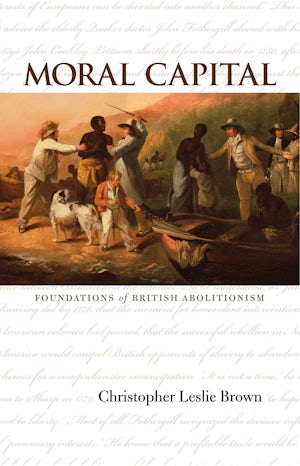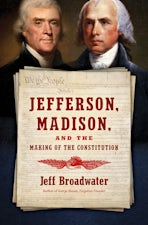Moral Capital
Foundations of British Abolitionism
By Christopher Leslie Brown
496 pp., 6.125 x 9.25, 8 illus., notes, index
-
E-book EPUB ISBN: 978-0-8078-3895-2
Published: December 2012 -
Paperback ISBN: 978-0-8078-5698-7
Published: March 2006 -
E-book PDF ISBN: 979-8-8908-7806-9
Published: December 2012
Published by the Omohundro Institute of Early American History and Culture and the University of North Carolina Press
Buy this Book
- Paperback $42.50
- E-Book $29.99
Published by the Omohundro Institute of Early American History and Culture and the University of North Carolina Press
Awards & distinctions
2007 Frederick Douglass Book Prize, Gilder Lehrman Center for the Study of Slavery, Resistance, and Abolition
A 2006 Choice Outstanding Academic Title
2006 Morris D. Forkosch Prize and 2006 James A. Rawley Prize in Atlantic History, American Historical Association
The debate over the political rights of the North American colonies pushed slavery to the fore, Brown argues, giving antislavery organizing the moral legitimacy in Britain it had never had before. The first emancipation schemes were dependent on efforts to strengthen the role of the imperial state in an era of weakening overseas authority. By looking at the initial public contest over slavery, Brown connects disparate strands of the British Atlantic world and brings into focus shifting developments in British identity, attitudes toward Africa, definitions of imperial mission, the rise of Anglican evangelicalism, and Quaker activism.
Demonstrating how challenges to the slave system could serve as a mark of virtue rather than evidence of eccentricity, Brown shows that the abolitionist movement derived its power from a profound yearning for moral worth in the aftermath of defeat and American independence. Thus abolitionism proved to be a cause for the abolitionists themselves as much as for enslaved Africans.
About the Author
Christopher Leslie Brown is associate professor of history at Rutgers University and coeditor of Arming Slaves: From Classical Times to the Modern Age.
For more information about Christopher Leslie Brown, visit
the
Author
Page.
Reviews
"Brown's Moral Capital is remarkable in . . . managing to say something genuinely new about a subject that has been discussed and written about for two centuries; and that . . . is no small achievement."--Times Literary Supplement
"A crucial intervention in our understanding of the international pressures that led to . . . the term 'British anti-slavery'. . . . . This meditation on the vastly complex social and iintellectual origins of British anti-slavery activism takes us back to basics, and asks radical questions that historians of the Atlantic diaspora will now need to ponder."-American Historical Review
"A provocative rereading of the origins of late eighteenth-century British antislavery. Beautifully written and elegantly paced. . . . [Brown's] is an outstanding contribution to an enormous and critical historiography."--Journal of American History
"An impressive array of primary sources. . . . Capturing the complexity of abolitionism's development . . . A significant study that sheds new light."--The Journal of Religion
"Elegant and persuasive. . . . Effectively reframe[s] our traditional portraits of antislavery as humanitarian reform more generally at the turn of the eighteenth century."--William and Mary Quarterly
"A comprehensive and encyclopedic analysis of early British abolitionism that will be standard reading for all interested in the subject.”--Journal of the Early Republic


